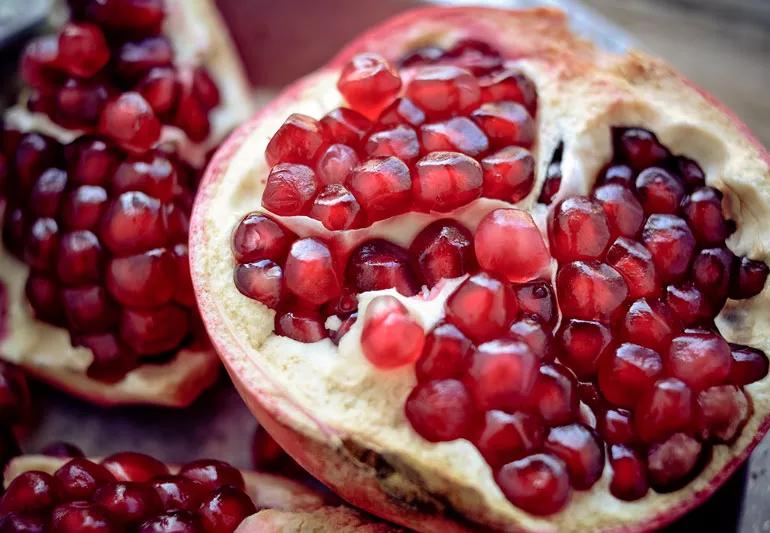Pomegranates and natural pomegranate juice have anti-cancer properties

Image content: This image is available to view online.
View image online (https://assets.clevelandclinic.org/transform/9c800494-8540-41e6-b69e-0c2fae69a544/pomegranateSeeds-157565485-770x533-1_jpg)
opened pomegranate with seeds
No doubt, they’re beautiful. Whether whole or simply a container of fresh ruby-red arils, pomegranates tend to grab your eye as you’re walking through the produce aisle. But their appeal isn’t just skin deep when you consider all the benefits they offer.
Advertisement
Cleveland Clinic is a non-profit academic medical center. Advertising on our site helps support our mission. We do not endorse non-Cleveland Clinic products or services. Policy
Registered dietitian Julia Zumpano, RD, LD, shares why these juicy, delectable fruits can be a great addition to your diet — and why the seeds are just as good as the juice.
Pomegranate seeds and juice directly from the fruit are always better than bottled juice, but both have their benefits. If you want to consume less sugar, instead of drinking bottled pomegranate juice, break the pomegranate open and eat the fruit on the inside. But be warned, there’s a trick to cutting the fruit open properly.
Here’s an easy way to peel a pomegranate:
Advertisement
Now that you know how to slice and dice pomegranates, here’s the rundown on some of their benefits.
Antioxidants are substances that help protect cells from environmental toxins such as contaminated air and cigarette smoke. Antioxidants are known to help prevent and repair DNA damage that can lead to cancer. Pomegranate juice alone won’t keep cancer at bay, but studies suggest it may be a nutritious addition to a healthy, plant-based diet such as the Mediterranean diet.
Some research found that components in pomegranate juice helped inhibit the movement of cancer cells by weakening their attraction to a chemical signal that promotes the spread of cancer.
Researchers from the University of California at Los Angeles found that pomegranate juice appeared to suppress the growth of cancer cells and decrease cancer cell death in men who’ve had preliminary treatment for prostate cancer.
“There are some studies with pomegranate that suggest a role in slowing the growth of prostate cancer,” Zumpano says. “But it should be noted that the studies suggest pomegranate juice and pomegranate fruits should be part of a healthy plant-based diet.”
Other studies suggest pomegranate peel extract has anti-cancer properties and that pomegranate peels could be used for additional medicinal properties.
Pomegranates have been used for thousands of years as an Ayurvedic medicinal food because of their antioxidant properties. Oxidative stress is related to many chronic diseases including diabetes and heart diseases. Because of its antioxidant properties, some studies have discovered pomegranates can improve oxidative stress factors and, therefore, positively impact these conditions.
In a 2022 comprehensive review of 10 of the most commonly available fruits and their effects on cardiovascular diseases, researchers noted pomegranates and pomegranate juice can have significant benefits for improving a number of heart conditions like high blood pressure, coronary artery disease and atherosclerosis.
Another 2021 study conducted on rats showed that pomegranate juice reduced the concentration of LDL, the “bad” cholesterol that forms plaque, by 39%, and indicated that it increased the concentration of HDL, the “good” cholesterol, by 27%.
“There are some studies that show pomegranates may help to prevent plaque buildup in your arteries,” Zumpano says. “If heart disease runs in your family, it might make sense to add pomegranate to your diet.”
All signs point to yes: Pomegranates are healthy when incorporated into a heart-healthy diet. Consider sprinkling them atop your salads, oatmeal, quinoa or yogurt. Pomegranates also complement poultry such as chicken and turkey dishes.
Advertisement
Half of a pomegranate is considered one serving of the fruit, which is in season from October through January. So, you have plenty of time to create or try a recipe or two.
Advertisement

Sign up for our Health Essentials emails for expert guidance on nutrition, fitness, sleep, skin care and more.
Learn more about our editorial process.
Advertisement
Pick bell peppers to help fight cancer, memory decline and joint pain
The tropical fruit is a good source of antioxidants and vitamin C
High amounts of cholesterol and saturated fat in red meat may be linked to heart disease
The leaves and pods from this tree are rich in essential nutrients
This starchy root vegetable is a staple in many global cuisines — but it has to be prepared correctly, or it can cause serious concerns
These delicate green sprouts can give you an extra dose of vitamin K and other nutrients — but they’re not safe for everyone
Edamame, lentils and chicken breast are good sources of protein
Eating this root vegetable can help support your eye, heart and brain health
Although it could be used as a moisturizer, this new trend is not recommended
Communicating clear limits helps protect your time, energy and emotional well-being
High cholesterol can be genetic, but testing and treatment can lower your heart disease risk